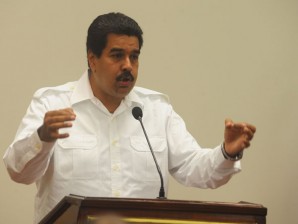
Venezuelian President Nicolas Maduro speaks on June 25 2013 at the presidential palace in Port-au-Prince, Haiti. Venezuela’s President Nicolas Maduro said June 25, 2013 he would consider an asylum request from US intelligence leaker Edward Snowden if the country receives one. “We have not received an official request. But in the event we were to receive one, we would evaluate it as we understand Ecuador is doing,” Maduro said on state television from Haiti, where he was on an official visit. Ecuador’s President Rafael Correa, a Venezuela ally and fellow leftist, has said he will take a decision on Snowden’s application “fully respecting our sovereignty.” AFP / THONY BELIZAIRE
CARACAS – Venezuela’s President Nicolas Maduro said Tuesday he would consider an asylum request from US intelligence leaker Edward Snowden if the country receives one.
“We have not received an official request. But in the event we were to receive one, we would evaluate it as we understand Ecuador is doing,” Maduro said on state television from Haiti, where he was on an official visit.
Ecuador’s President Rafael Correa, a Venezuela ally and fellow leftist, has said he will take a decision on Snowden’s application “fully respecting our sovereignty.”
Snowden was believed to be on his way to Ecuador when he left Hong Kong and landed in Moscow on Sunday, but Russian President Vladimir Putin said he was still in the transit area of the Russian airport Tuesday, though free to leave.
Correa granted asylum to WikiLeaks founder Julian Assange in August last year, allowing him to take refuge in Ecuador’s London embassy and avoid extradition to Sweden, where he is wanted for questioning on sexual assault.
Maduro, the handpicked heir of Hugo Chavez, who was declared winner of a disputed election in April, shares his predecessor’s distrust of Washington.
During his 14-year reign Chavez — who died of cancer in March — inveighed against US “imperialism” and befriended US foes in Iran and Syria.
Snowden, a former IT contractor for the US National Security Agency, leaked details of vast US surveillance programs to the media and is now wanted in the United States on charges of espionage.
He initially surfaced in Hong Kong — a semi-autonomous Chinese territory — where he admitted to being the source of the leaks and detailed US hacker operations against China and other countries.
The United States has lashed out at Russia and China for refusing to detain Snowden, and has been in contact with unnamed governments in the Western Hemisphere to demand that they bar Snowden from further travel.
Caracas and Washington have not exchanged ambassadors since 2010 and have had thorny relations for years, even as Venezuela exports 900,000 barrels of oil per day to the United States.